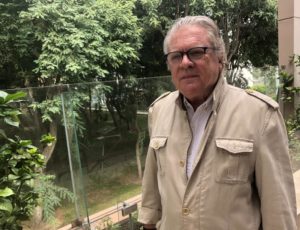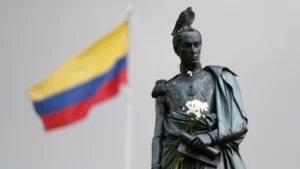Publicado en: The New York Times
Por: Jaime Lalinde

Cortesía: Lisbeth Salas
IT WOULD BE NIGHT IN CARACAS
Translated by: Elizabeth Bryer
Karina Sainz Borgo’s debut novel begins with an epigraph from Borges: “They willed me bravery. I wasn’t brave.” When given the chance to act with solidarity or good will, the narrator of “It Would Be Night in Caracas,” Adelaida Falcón, more often chooses self-interest. As it turns out, this isn’t a distinguishing characteristic. In the Venezuela of Sainz Borgo (a Caracas-born journalist), opportunism has replaced mercy.
At the start of the novel, Adelaida’s mother has died, and she is left to plan the funeral. But burying her mother is complicated by the fact that in Caracas, the bare necessities are either scarce (rice, flour, medical supplies) or nonexistent. “We could only watch as everything we needed vanished: people, places, friends, recollections, food, serenity, peace, sanity.” There are two forms of currency — bolívares and bolívares fuertes — but it takes Adelaida’s last black-market euro note to rent the chapel.
Leaving the graveyard, Adelaida comes upon a group of red-shirted government loyalists. They are known as the Fatherland’s Motorized Fleet, and their patrols control food rations, kill protesters and operate with state-sanctioned immunity. The gang is burying one of their dead and, according to some strange new burial rite, a young girl is grinding on his coffin to a reggaeton song.
In the days and weeks following her mother’s death, Adelaida feels her life become small and chambered. She seals the windows of the apartment they’d shared with duct tape so tear gas doesn’t drift in. She passes the time by counting the gunshots outside and boxing up her mother’s things. At night there are blackouts. From the window, Adelaida watches caraqueños on the street below make light by burning currency.
One day, Adelaida listens as the couple upstairs is robbed; a member of the military intelligence walks away with a microwave. “To survive, we had to do things we’d never imagined,” she says. “Prey upon others, or remain silent; leap on someone else’s neck, or look the other way.”
Soon, the loyalists’ patrols, called the Sons of the Revolution, set up an outpost across the street from Adelaida’s apartment. For all the emphasis on mothers and daughters in the novel — there’s also her next-door neighbor Aurora, and a Chilean girl she knows from primary school — the story’s fathers and sons are either absent or felt only in their negative space. Santiago, the brother of Adelaida’s closest friend, is in prison for demonstrating. She reminisces about Francisco, her journalist ex-boyfriend, and an unnamed father she has never met. But it’s the Fatherland’s Motorized Fleet and the Sons of the Revolution that are the state made flesh and blood.

Eventually, Adelaida, returning home from a failed attempt to pick up a ration of flour, finds her key won’t work; the lock, she sees, is new. It’s the Sons of the Revolution. A woman named La Mariscala answers the door wearing Adelaida’s mother’s clothes. “This apartment is ours now,” the intruder says. “Like everything else, it was always ours, only you took it from us.”
Ultimately, it’s two dead bodies that give Adelaida the faintest possibility of an escape: first her mother’s, and then Aurora’s. After coming to in the hallway, Adelaida discovers Aurora dead next door. Inside, next to the eggs she “had been beating to white peaks when death took her,” there is a letter from the Spanish Embassy about Aurora’s passport application. Adelaida realizes her opportunity to leave Venezuela rests on her decision to take on this new identity. There is no migration without erasure.
Aurora is known to all as “the Spanish woman’s daughter,” or “la hija de la española,” which is the novel’s title in Spain and Latin America. As an exercise in the role that translation (or mistranslation) plays in the novel-as-product, it’s interesting to consider this alternate title. The conditional “would be” isn’t strictly future or present tense — it’s an event that may or may not be true, now or ever, thus giving the title a sense of the unreal. In that unreality, we can hear the distance between a speaker and a city she can only imagine.
Though her novel is largely allegorical, Sainz Borgo avoids a narrative that is overly reduced by symbols; the writing, like Coetzee’s, is tense and complex. In her hands, Borges’s question of bravery — and its obverse, cowardice — isn’t a neon theme, but rather a dynamic system made up of choices.
Borges once told his translator Norman Thomas di Giovanni to write not what he said, but what he was trying to say. Throughout “It Would Be Night in Caracas,” there are places where its translator, Elizabeth Bryer, does neither. “Jello” is translated as “jelly.” The word “worm,” spoken by a police officer to a protestor, is translated as “slug.” The phrase “I’ll make you a deal” becomes “I’ll do you a deal” — which manages to make the character sound foreign in her own language.
Early in the novel, at her mother’s burial, Adelaida recalls something written by the Colombian novelist Juan Gabriel Vásquez: “Each of us belongs to the place where our dead are buried.” The statement sounds more like a question coming out of Adelaida’s mouth. What might it mean to be in a place she does not belong? Who might she be?
Near the end, Adelaida returns to her mother’s grave. Embossed letters have been stolen from the gravestone, the name she shared with her mother gone: “For losing, we even lost our name. The Falcóns, queens of a world that was in its death throes.” Sainz Borgo stretches for, but doesn’t quite reach, a response to Vásquez. Though in that mysterious meaning-making machine that is a novel, she accidentally finds a better way to a















